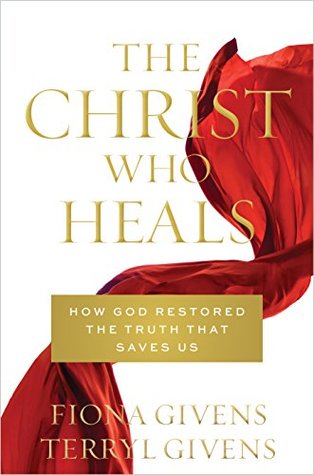More on this book
Kindle Notes & Highlights
by
Fiona Givens
Read between
December 18, 2018 - March 4, 2020
In other words, he clarifies that we might better consider that certain “consequences,” rather than imposed penalties or rewards, follow our choices.
Appeasing some abstract justice, or propitiating a sovereign God, is not the point. The preservation in the universe of real opposites, and real stakes, in order to assure the efficacy of agency, is.
Joseph spoke to similar effect: “When persons manifest the least kindness and love to me, O what power it has over my mind, while the opposite course has a tendency to harrow up all the harsh feelings and depress the human mind.”34
threefold covenant to bear one another’s burdens, to mourn with those in mourning, and to comfort the comfortless.
to bear another’s burden requires that we kneel beside that person and feel the weight of her or his cross.
Within our mortal limits, we are asked to imitate his acts of infinite empathy. If we deprive ourselves of sharing the crosses of our fellow pilgrims, we have impeded the only principles by which heavenly society is created.
And so the sacrament commemorates Christ’s resurrected body, even as it signifies the promise of our own.
Accusatory judgment is Satan’s role, not Christ’s. “We do not know the inmost depths of the human heart; it is revealed only to love. But those who condemn have generally little love, and therefore the mystery of the heart which they judge is closed to them.”
It is impossible to know another completely and not love that person deeply.
man must “in the name of Christ forgive his neighbor’s sin and evil and help him to free himself from their power. If a man is condemned [by us] as hopelessly wicked, this does not help to liberate or save or improve him. On the contrary, the condemnation ruins him.”15 This is why mercy “is twice blessed; it blesseth him that gives, and him that [receives].”
First, we believe that we are free to choose, and that we will ultimately receive what we choose. That is a core truth of the universe because, as we saw above, that is what Christ’s Atonement guaranteed. If “you are merciful unto your brethren . . . ye shall have mercy restored unto you again.”17 Second, as Latter-day Saints, we know we do not earn heaven; we co-create heaven, and we do so by participating in the celestial relationships that are its essence (and which temple ordinances eternalize). In a very real sense, then, the act of forgiving one another is the healing and constituting of
...more
“The nearer we get to our heavenly Father the more are we disposed to look with compassion on perishing souls to take them upon our shoulders and cast their sins behind our back,”
there is no “being who can know how much and how sweetly and how tenderly the Creator loves us.”20 The poet William Blake believed our capacity to love was in need of mortal stretching, hence we came to earth “that we may learn to bear the beams of love.”21 It is no easy thing, in our finitude, to comprehend a love that enfolds the cosmos, yet knows us by name. Enoch’s soul had to swell “wide as eternity”22 before he could take in the grandeur of godly compassion—and the experience shook the heavens.
Judgment prevents condemnation, it does not precede it. Judgment is an assist in recognizing our true condition in order that we may improve it, not suffer from it. This moment of coming to oneself, Jacob describes as coming to a “perfect [complete] knowledge” of ourselves.
The promise made by the Savior is one of unimaginable joy—perfect, untainted, unqualified joy: “And God shall wipe away all tears from their eyes; and there shall be no more death, neither sorrow, nor crying, neither shall there be any more pain.”17 But if God shall wipe away all tears, he can only do so by triumphing over the cause of those tears, which is death’s severing of our most intimate family ties and connections. Any joy we savor in the absence of our loved ones is a partial joy, a fractured joy. Heaven apart from those we love is just hell by another name. Joseph said as much: “let
...more
We should read Christ’s words as expressing his hope, his wish—even his promise—that we will eventually fill the measure of our creation, become complete and whole, as part of a process he is overseeing and guiding as our Shepherd and Healer.
The model for this salvific priesthood is the power by which the Great High Priest effects his Atonement; he exemplifies noncoercive love as that which binds all humans in perfect at-one-ment: “in him all things hold together.”
Scripture is emphatic that Christ’s atoning sacrifice is efficacious by virtue of this draw, the pull, the attractive power it exerts upon our hearts. If “every knee shall bow to” Christ and “every tongue” confess him,32LDS scripture suggests it will be a joyful, grateful, voluntary bow, in consequence of the vulnerability of the Savior, a God given to weeping over and in solidarity with the misery of his children, and not in consequence of his active demand. His power is a noncoercive power: “He layeth down his own life that he may draw all men unto him. Wherefore, he commandeth none that
...more
Roman centurion is emblematic of all so redirected when, stunned by the irruption of absolute love, he could not help but exclaim: “Truly this man was the Son of God.”


